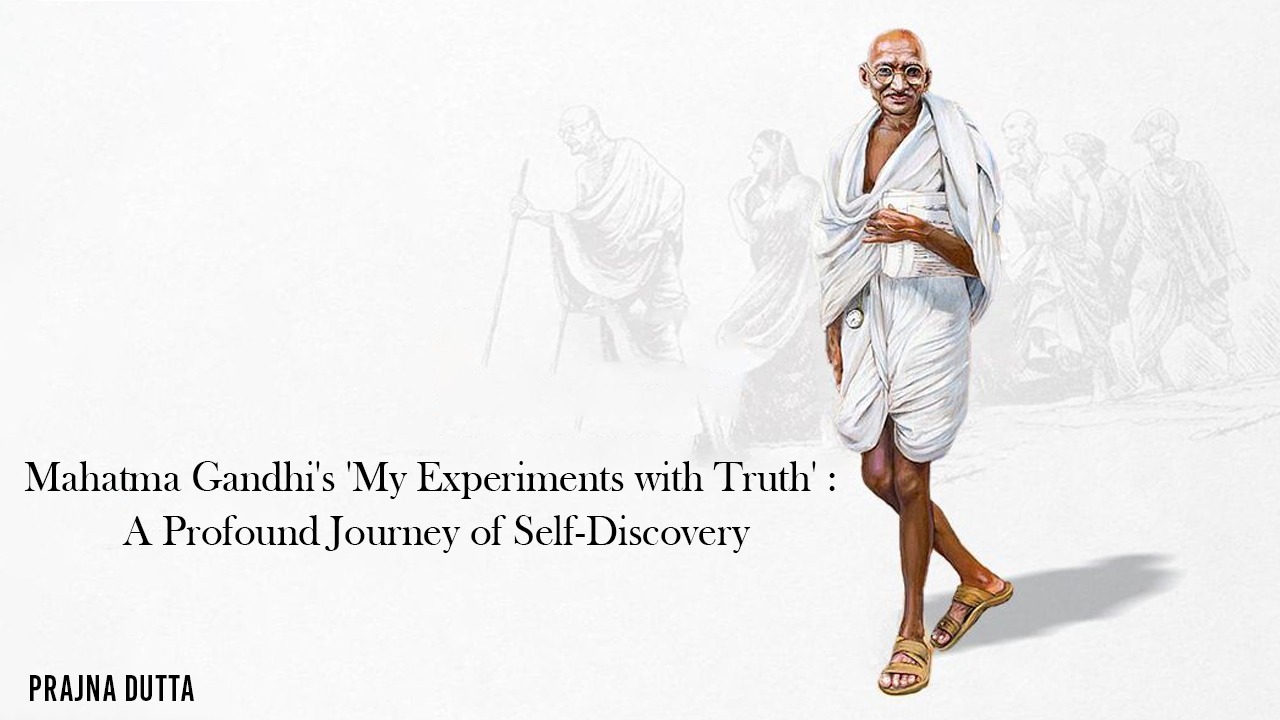Introduction:
Mohandas Karamchand Gandhi, popularly known as Mahatma Gandhi, was an iconic figure in India's struggle for independence and a global symbol of peace and nonviolence. Throughout his life, Gandhi chronicled his thoughts, beliefs, and transformative experiences in his autobiography, "My Experiments with Truth." Published in 1927, this remarkable book offers readers an intimate glimpse into the life and mind of one of history's most influential leaders. By sharing his personal struggles, beliefs, and experiments, Gandhi opens the doors to his spiritual and philosophical evolution, inspiring generations to come.
A Journey of Self-Exploration:
"My Experiments with Truth" is not a conventional autobiography but a narrative of Gandhi's spiritual and moral journey. It traces his life from his childhood in Porbandar, Gujarat, to his experiences in South Africa, and finally his leadership role in India's freedom struggle. The book delves into his formative years, exploring the influences and events that shaped his character and ideals.
Gandhi's search for truth and his commitment to satyagraha (nonviolent resistance) are central themes throughout the book. He explores his early experiments with vegetarianism, abstinence from various pleasures, and his spiritual encounters that kindled his belief in nonviolence. Gandhi sought to align his actions with his core values, and his personal experiments became guiding principles for his political and social activism.
The Power of Nonviolence:
Gandhi's philosophy of nonviolence, or ahimsa, is a recurring theme in "My Experiments with Truth." He passionately advocates for nonviolent resistance as a means to address social injustices and bring about political change. Through his own experiences and reflections, he demonstrates that nonviolence is not a sign of weakness but a powerful force capable of transforming individuals and societies.
Gandhi's adherence to truth and nonviolence, despite facing immense challenges and opposition, is truly inspiring. He recounts his struggles with racial discrimination in South Africa, his efforts to address caste discrimination in India, and his unwavering commitment to nonviolent civil disobedience against British colonial rule. Gandhi's personal anecdotes illustrate the transformative power of nonviolence and its potential to create lasting change.
Introspection and Self-Critique:
An essential aspect of "My Experiments with Truth" is Gandhi's unflinching self-examination. He fearlessly reflects on his own shortcomings, prejudices, and failures. Gandhi's honesty and self-critique provide valuable lessons in humility and personal growth. By sharing his vulnerabilities, he encourages readers to embark on their own journey of self-discovery and to confront their own imperfections.
Gandhi's introspection extends to his personal life, including his troubled relationships, struggles with celibacy, and his experiments with brahmacharya (celibate living). His openness about these deeply personal aspects of his life humanizes him and makes his experiences relatable to readers of all backgrounds.
Legacy and Relevance Today:
Almost a century after its publication, "My Experiments with Truth" remains a significant literary work that transcends time and borders. Gandhi's exploration of truth, nonviolence, and self-discipline continues to resonate with individuals seeking moral guidance and social change. His belief in the power of personal transformation to impact the world serves as a reminder that every individual has the capacity to contribute to positive change.
In today's world, characterized by social, political, and environmental challenges, Gandhi's teachings hold immense relevance. His emphasis on truth, integrity, and nonviolence offers a framework for addressing conflicts, promoting social justice, and fostering compassion and understanding. The book serves as a guide for individuals seeking to make a difference in their communities and to create a more peaceful and just world.
Furthermore, "My Experiments with Truth" invites readers to reflect on their own values, choices, and actions. Gandhi's emphasis on self-discipline, simplicity, and living in harmony with nature resonates with contemporary concerns about consumerism, environmental degradation, and the pursuit of material wealth. His ideas encourage individuals to prioritize inner growth and personal transformation as a means to create a more sustainable and fulfilling existence.
Gandhi's book also highlights the power of resilience and perseverance in the face of adversity. His unwavering commitment to nonviolence and his ability to maintain his principles despite immense challenges serve as an inspiration in times of struggle and uncertainty. In a world often driven by aggression and division, Gandhi's message of empathy, understanding, and peaceful resistance remains a powerful antidote.
Conclusion:
Mahatma Gandhi's "My Experiments with Truth" is a profound testament to the transformative power of personal introspection, nonviolence, and the pursuit of truth. Through his narrative, Gandhi invites readers to embark on their own journey of self-discovery and to align their actions with their core values. His teachings continue to inspire individuals around the world, offering a timeless guide for personal growth, social change, and the creation of a more just and compassionate society. As we navigate the complexities of the modern world, Gandhi's message serves as a beacon of hope and a reminder that the pursuit of truth and nonviolence can lead to profound and lasting transformation.

Comments